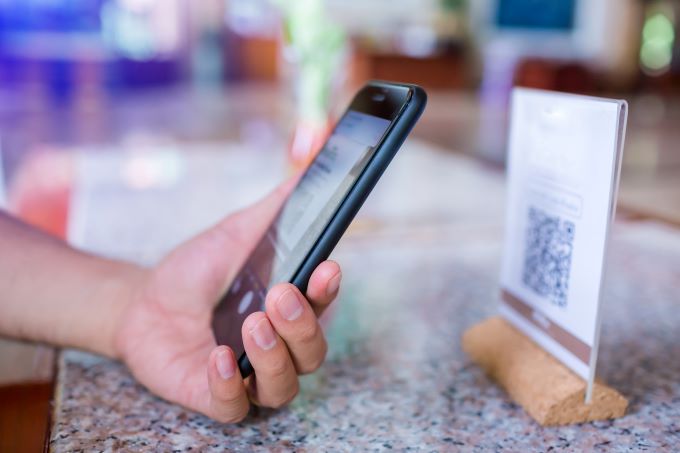
Could QR codes transform hospitality?
Could QR codes revolutionise the hospitality industry? While far from being mainstream in Australia, the use of QR codes is on the rise thanks to improved technology and innovations in consumer engagement.
Created in the early 1990s by a subsidiary of Toyota, QR (quick response) codes are a sophisticated form of barcode that can hold up to 100 times more information than their traditional counterparts. However, they had fallen out of favour with advertisers by 2012, in large part due to their clunky nature.
In short, QR codes provide an easy link (like a hyperlink in an email) to a web page that can contain a range of content from text, images and video or even a survey.
To scan a QR code with their smartphone, users first had to download a third-party app. Now, most smartphones have a built-in QR code scanning camera, which saves a significant amount of hassle and makes the technology far more appealing.
As such, this presents hotels with new opportunities to engage guests with QR codes, from interactive marketing to transforming the on-property experience.
The rise of QR codes in travel
QR codes are already huge in China. When it comes to travel, Chinese travellers can use QR codes for virtually every element of their trip, from booking flights to paying for hotels and handling all transactions during their stay. All of which is facilitated through WeChat and mobile payment apps such as Alipay.
In fact, a new service launched last year in China lets guests scan a QR code to check if their sheets and towels have been thoroughly washed. For hotels looking to capitalise on high-spending Chinese tourists, providing QR code technology is a vital step.
Of course with growing global popularity, QR codes offer a host of advantages that all travellers can benefit from. With that in mind, here are some of the pros and cons for hotels to consider.
The pros of QR codes
By pointing a camera and scanning a code, your guests can potentially do anything from making payments and learning about your rooftop bar to redeeming rewards and booking amenities.
- Enhanced room service
Hotels are now starting to use QR codes instead of printed materials to increase guest engagement and create upsell opportunities. When it comes to in-room dining, physical menus with a contact number can be replaced by a QR code on the table stand. When scanned, guests can see the menu and place orders entirely through their smartphones.
Back in 2011, Radisson Edwardian in the UK introduced QR codes to their menus so guests could see a video of how their selected dish was prepared.
The same principles can be used to digitise any printed material, including spa treatment menus, pillow menus, or your hotel’s in-room compendium.
Not only does this make accessing information more convenient for guests, it transforms printed information into dynamic digital content.
Plus, your hotel can easily update its menus and push new offers/promotions to drive additional revenue.
- Showcasing amenities
QR codes can also be added anywhere around your property to showcase amenities and make information simple to find. Upon scanning a QR code by your gym, guests could receive images or video on their smartphones about opening hours and fitness classes. Or a QR code in your lobby could link to a video promoting your business lounge, bar or your rooms and suites.
A prompt can then be added to this digital content that encourages guests to make a booking or request more information.
Again, this is a great way to drive extra revenue while keeping guests informed about everything your hotel has to offer.
- Promoting your destination
To help guests experience the best of your destination, QR codes can be embedded with details about local events and attractions. You could use this approach to promote the best restaurants in town, must-visit tourist spots, family-friendly attractions or the latest live music festival.
Getting even more creative, you could place QR codes in strategic ways based on the purchase habits of guests. Imagine adding a QR code to wine bottles from a local vineyard that are available in your hotel restaurant. When guests scan the code, they could be taken to a webpage of the vineyard where they can book a tour.
- Dynamic marketing
QR codes are an ideal way to create more dynamic marketing content, both online and offline. For instance, an advert for your hotel in a newspaper or magazine could include a QR code that, once scanned, sends the user to a specific page on your hotel website or a dedicated landing page built around an offer.
QR codes are also highly unique, so you can track (for example) which locations attracted the most traffic to your website.
The downsides of QR codes
There’s no doubt that QR codes offer plenty of great benefits. But there are also a few drawbacks to consider.
- Scanning can be a hassle
Even without the need to download a relevant app, QR codes involve a certain amount of delay. A guest has to unlock their phone, scan the code, and wait for the information to load (which is dependent on the quality of the Wi-Fi). While not a huge hassle, there are more frictionless alternatives on the horizon, which brings us to the next point….
- Replaced by new technology
QR codes may become obsolete with the rollout of new technologies. While there are lots of potential contenders, facial recognition is the most interesting – mostly due to the seamless experience it offers. While far from becoming mainstream, Alibaba’s futuristic FlyZoo hotel shows what’s possible – it’s facial recognition technology includes frictionless check-in and doors that open by scanning your face.
- Vulnerable to cybercrime
Another potential concern is QR code security: criminals could be able to change a legitimate QR code for their own.
This would require a physical image being changed, which is highly unlikely within a hotel. This is more likely an issue on posters displayed in public places such as a bus stop.
If a user was to scan the “fake” QR code, they’re could be routed to a malicious phishing website.
Being taken to the website alone is not a security risk but if they were then unwittingly to hand over personal details that could be an issue.
QR codes in hospitality
In the past few years, QR codes have made a big comeback. Primarily as they are so easy to use and can provide ready access to a host of information. The latest smartphones can now read QR codes natively with their camera taking away the need to download a QR code scanning app. There have also been some innovative new uses of the technology, from in-room menus and marketing campaigns to providing personalized welcomes in a decorated cookie.
The benefits are undoubted. The drawbacks are few but can’t be ignored. Will QR codes truly enjoy a resurgence and find favour in the hospitality experience? Only time will tell.
With a great passion for all things hotels, but in particular technology and a desire to help others his role as director at Technology4Hotels allows him to do both. Brendon has worked with hundreds of hotels to help them with their in-room technology. In the last few years he has helped them to increase guest satisfaction, strengthen guest loyalty and encourage repeat bookings as well as win awards such as the best business hotel, best city hotel, best upscale hotel and best luxury hotel in Australasia. Always going the extra mile, Brendon began his hospitality career over twenty five years ago working in 5 star hotels whilst completing his Bachelor of Business in Hotel Management. He has held various management positions within 5 star hotels, worked as a consultant in both hotel feasibility and technology and has an extensive background in hotel technology.







